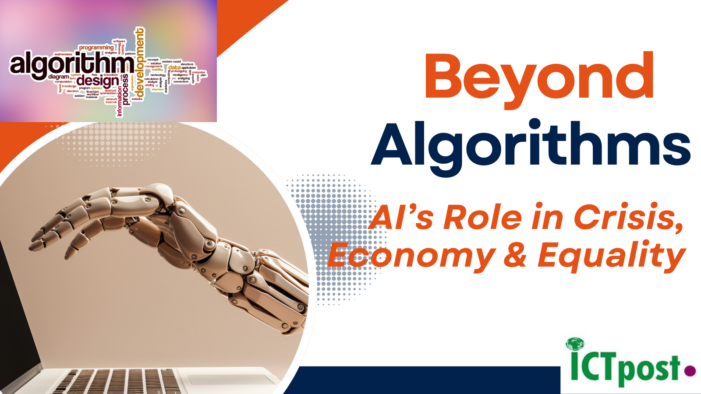ICTpost Media Action
AI has the potential to be a game-changer in crisis management, economic resilience, and social equality, but its impact depends on responsible deployment and ethical governance. By investing in robust infrastructure, aligning AI with policy priorities, and fostering inclusive innovation, societies can maximize AI’s benefits while mitigating risks. India, with its digital transformation efforts, stands at a crucial juncture to lead AI-driven progress in an equitable and sustainable manner. Policymakers, businesses, and civil society must work together to ensure AI serves as a tool for empowerment rather than exclusion, driving long-term growth and stability for all.
Infrastructure in AI-Driven Solutions
Modern problem-solving and entrepreneurship rely on access to basic resources such as reliable internet, computing devices, and stable energy sources. Without these, AI-driven solutions cannot be effectively implemented.
For example, Ethiopia, home to over 100 million people, faces major challenges in AI adoption due to inadequate infrastructure, particularly in rural areas. The lack of reliable electricity and internet access limits the use of AI tools for healthcare, agriculture, and education. Countries like India and Brazil have demonstrated that investing in digital infrastructure can significantly improve AI adoption.

Crisis Management and Economic Resilience
AI has become a powerful tool in crisis management. In Ukraine, where ongoing conflict threatens the economy, AI-driven data analytics help the government and municipal authorities maintain financial stability. AI-powered risk assessment models, developed by a team spread across eight locations, ensure the resilience of Ukraine’s banking system, preventing deeper economic crises.
Similarly, AI enhances disaster response efforts. In British Columbia, Canada, AI-integrated wildfire mitigation systems use real-time data, predictive analytics, and inter-agency coordination to improve disaster preparedness. The U.S. National Oceanic and Atmospheric Administration (NOAA) employs AI to track hurricanes, analyze climate patterns, and issue early warnings, reducing economic and human losses.
AI for Workplace Equality and Risk Mitigation
AI’s impact extends beyond economic resilience to promoting workplace equity. AI-driven scorecards rank companies on inclusivity and work culture by analyzing hiring patterns, promotion trends, and employee satisfaction data. For instance, platforms like LinkedIn and Glassdoor use AI to track diversity metrics and expose hiring biases, encouraging corporations to adopt fair practices.
In the financial sector, AI-driven risk assessment tools are being used to detect discrimination in lending practices.

AI as Critical Infrastructure
AI and cyber networks now serve as the backbone of essential societal functions, from banking to electricity grids. However, AI development often lacks structured oversight, leading to issues in reliability and accountability.
Consider the Boeing 737 MAX crisis, where flawed AI-driven automation contributed to fatal crashes. This highlights the need for rigorous validation and ethical AI development. Just as aircraft and bridges undergo stringent safety testing, AI systems should be built on a foundation of strong data, transparent validation, and responsible assumptions.
The Power of AI for Global Good
AI should serve everyone, not just a privileged few. Businesses and governments must view communities as partners rather than mere resources. AI-driven tools can enhance inclusivity by providing marginalized groups with access to healthcare, education, and economic mobility. In the U.S., AI-driven tutoring systems like Khan Academy’s AI-based learning tools help bridge educational disparities, particularly in underprivileged communities.

A Call for Ethical and Proactive AI Development
Rather than fearing AI’s disruptions, society should proactively invest in ethical AI research and development. AI should be harnessed to tackle global challenges such as climate change, disaster preparedness, and economic inequality.
By establishing transparent frameworks, fostering public-private collaboration, and ensuring AI serves societal needs, we can build a future where technology enhances human progress. A balanced approach that integrates AI with economic foresight, engineering principles, and ethical governance will ensure AI becomes a tool for positive global transformation.
Lessons for India
India, with its vast population and diverse socio-economic landscape, must leverage AI not just as a technological innovation but as a driver of inclusive development.
- Disaster Resilience: AI-driven analytics can improve early warning systems for floods and cyclones, reducing the impact of natural disasters. The Indian Meteorological Department (IMD) already employs AI to predict monsoons, helping farmers plan their crops more effectively. According to NITI Aayog, AI-based early warning systems could reduce disaster response time by up to 30%, potentially saving thousands of lives and billions in economic losses annually. In 2020 alone, Cyclone Amphan caused $13 billion in damages; better AI-driven prediction models could mitigate such losses in the future.
- Financial Inclusion: AI supports microfinance institutions in assessing credit risk for small businesses, fostering grassroots entrepreneurship. Companies like Paytm and PhonePe use AI-powered risk analysis to enable small merchants to access digital credit. According to the Reserve Bank of India (RBI), AI-driven credit scoring has increased financial accessibility for nearly 40 million unbanked individuals in the past five years. AI-backed lending platforms have also reduced loan approval times by 60%, accelerating financial growth in rural areas.
- Workplace Diversity: AI-powered hiring platforms can help bridge gender and socio-economic disparities by promoting fair recruitment practices. For example, Indian startups like Belong.co use AI to reduce hiring biases and improve workplace diversity.
These benefits, however, can only be realized if AI deployment is guided by ethical principles and aligned with India’s policy priorities. Ensuring that AI serves the broader goal of equitable and sustainable growth should be a key focus for policymakers and businesses alike.








